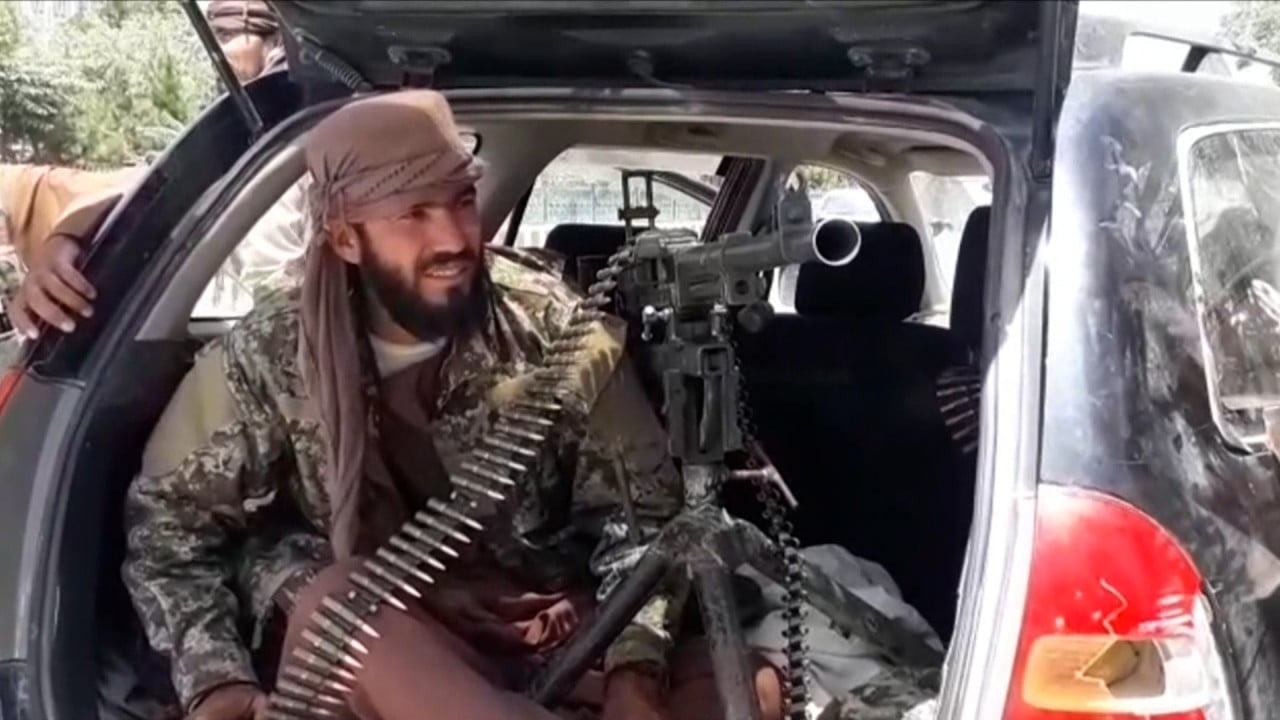
Taliban captures three more Afghan cities in lightning offensive as embassies evacuate staff
- The insurgents took control of Kandahar, Herat and Lashkar Gah and detained veteran anti-Taliban commander Ismail Khan
- The UN warned that a Taliban offensive reaching the capital would have a ‘catastrophic impact on civilians’
The capture of the second-biggest city of Kandahar in the south and Herat in the west after days of clashes are a devastating setback for the government as the deadly Taliban insurgency turns into a rout of the security forces.
“The city looks like a front line, a ghost town,” provincial council member Ghulam Habib Hashimi said by telephone from Herat, a city of about 600,000 people near the border with Iran.
“Families have either left or are hiding in their homes.”
A government official said: “Following heavy clashes late last night, the Taliban took control of Kandahar city.”
The defeats have fuelled fears the US-backed government could fall to the insurgents as international forces complete their withdrawal after 20 years of war.
A US defence official cited American intelligence as saying this week that the Taliban could take Kabul within 90 days.
The UN World Food Programme sees food shortages in Afghanistan as “quite dire” and worsening, a spokesperson said, adding the situation had all the hallmarks of a humanitarian catastrophe.
Of Afghanistan’s major cities, the government also still holds Mazar-i-Sharif in the north and Jalalabad, near the Pakistani border in the east.
In response to the Taliban advances, the Pentagon said it would send about 3,000 extra troops within 48 hours to help evacuate US embassy staff.
“We are further reducing our civilian footprint in Kabul in light of the evolving security situation,” US State Department spokesman Ned Price told reporters, while noting the embassy would remain open.
“This is not abandonment. This is not an evacuation. This is not the wholesale withdrawal.”

03:10
Taliban seizes control of second-largest city Kandahar in key moment in Afghanistan conflict
Britain said it would deploy about 600 troops to help its citizens leave while other embassies, including that of the Netherlands, and aid groups said they were also getting their people out.
Many embassies were asking staff to destroy or remove classified documents as part of evacuation plans, a Western official said.
“I think we are heading towards a civil war,” British Defence Secretary Ben Wallace told the BBC.
Canada would also deploy special forces troops to Kabul to help in the evacuation of embassy staff, AP reported.
Television footage showed families camping out in a Kabul park with little or no shelter, escaping violence elsewhere in the country.
The UN has warned that a Taliban offensive reaching the capital would have a “catastrophic impact on civilians” but there is little hope for negotiations to end the fighting with the Taliban apparently set on a military victory.
The Taliban also captured the towns of Lashkar Gah in the south and Qala-e-Naw in the northwest, security officers said on Friday. Firuz Koh, capital of central Ghor province, was handed over without a fight, officials said.
The militants, fighting to defeat the government and impose their strict version of Islamic rule, have taken control of 14 of Afghanistan’s 34 provincial capitals since August 6.
In a blow to anti-Taliban forces, the insurgents detained veteran commander Mohammad Ismail Khan after they seized Herat, a provincial official said, adding that they had promised not to harm him and other captured officials.
A Taliban spokesman confirmed that Khan, who had been leading fighters against the Taliban in recent weeks, was in their custody.

Biden said this week he did not regret his decision, noting Washington has spent more than US$1 trillion in America’s longest war and lost thousands of troops.
The loss of the economic hub of Kandahar will be a heavy blow to the government. It is the heartland of the Taliban, ethnic Pashtun fighters who emerged in the province in 1994 amid the chaos of civil war to sweep through most of the rest of the country over the next two years.
Government forces still controlled Kandahar’s airport, which was the US military’s second biggest base in Afghanistan during their 20-year mission, an official said.
Lashkar Gah is the capital of the southern opium-growing province of Helmand, where British, US and other foreign forces battled the insurgents for years.
The US State Department said Secretary of State Antony Blinken and Defence Secretary Lloyd Austin spoke to President Ashraf Ghani on Thursday and told him Washington “remains invested in the security and stability of Afghanistan”. They also said the US was committed to supporting a political solution.
US Senate Republican leader Mitch McConnell said the exit strategy was sending the US “hurtling toward an even worse sequel to the humiliating fall of Saigon in 1975,” urging Biden to commit to providing more support to Afghan forces.
“Without it, al Qaeda and the Taliban may celebrate the 20th anniversary of the September 11 attacks by burning down our Embassy in Kabul.”

In the deal struck with former US president Donald Trump’s administration last year, the Taliban agreed not to attack US-led foreign forces as they withdrew.
They also made a commitment to discuss peace but intermittent meetings with government representatives have gone nowhere. International envoys to Afghan negotiations in Qatar called for an accelerated peace process as a “matter of great urgency” and for a halt to attacks on cities.
Pakistani Prime Minister Imran Khan said this week the Taliban had refused to negotiate unless Ghani resigned from the presidency.
Islamabad officially denies backing the Taliban but it has been an open secret that Taliban leaders live in Pakistan and recruit fighters from a network of religious schools in the country.

